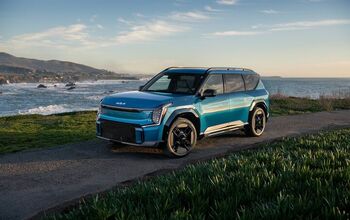New Bill Aims to Boost America's EV Adoption

Representative Debbie Dingell (D-MI) introduced new legislation on Wednesday in a bid to improve the uptake of electric vehicles in the United States. The bill, known as the USA Electrify Forward Act, would appropriate $2 billion annually for the U.S. Department of Energy’s Advanced Technology Vehicles Manufacturing Incentive Program between 2021 and 2035.
Dingell cited a May 2019 AAA survey that reported just 16 percent of Americans as saying they would consider an electric vehicle for their next automotive purchase, claiming something needs to be done address EV pricing, repair costs, and range. The primary focus of the bill is to help in the development and manufacturing of advanced battery technologies and anything else that might help get more Americans into EVs.
That includes other plug-in tech, plus improvements to the United States’ charging network. USA Electrify Forward Act is also supposed to direct the Department of Transportation to modernize residential and commercial building codes to encourage the installation of higher capacity charging ports. Additionally, it asks states to take separate measures to ensure EV charging stations proliferate.
“We must continue to keep the United States at the forefront of innovation and technology, while simultaneously address critical environmental issues including the reduction of our carbon footprint. Electric vehicle development and deployment is critical to advancing the future of transportation, creating jobs and addressing climate change,” Dingell stated.
“The USA Electrify Forward Act makes critical investments in manufacturing and infrastructure to lower costs for consumers and producers. Americans have a growing interested in electric vehicles, but we must take steps now to inspire greater consumer confidence and ensure American Made electric vehicles are the greatest in the world. We also want to ensure that Michigan remains the global center of the auto industry.”
Rep. Dingell’s ultimate goal is to ensure the United States swiftly transitions “to a clean, net zero emissions economy” with a comprehensive charging infrastructure and a bunch of EV manufacturing centered in the midwest. She’s also part of a coalition of lawmakers — along with Reps. Aston Donald McEachin (D-VA), Deb Haaland (D-NM), Earl Blumenauer (D-OR), Paul Tonko (D-NY), and Chellie Pingree (D-ME) — who’ve set goal of achieving a 100 percent clean energy economy by 2050.
While there was also a nod to promoting job creation, the complete text of the USA Electrify Forward Act doesn’t get terribly specific on the matter. The Trump administration has basically accused electrification of obliterating jobs — something that rings true after seeing automakers cut positions around the globe to free up cash for expensive mobility/EV projects. But there’s no real way of knowing if that will be the case years down the road, once EVs are more commonplace. Less parts likely means fewer hands on the assembly line but, if that’s the direction the world is heading anyway, there’s reason to examine the situation and attempt to be ready. We just can’t say whether or not the USA Electrify Forward Act will be truly helpful.

A staunch consumer advocate tracking industry trends and regulation. Before joining TTAC, Matt spent a decade working for marketing and research firms based in NYC. Clients included several of the world’s largest automakers, global tire brands, and aftermarket part suppliers. Dissatisfied with the corporate world and resentful of having to wear suits everyday, he pivoted to writing about cars. Since then, that man has become an ardent supporter of the right-to-repair movement, been interviewed on the auto industry by national radio broadcasts, driven more rental cars than anyone ever should, participated in amateur rallying events, and received the requisite minimum training as sanctioned by the SCCA. Handy with a wrench, Matt grew up surrounded by Detroit auto workers and managed to get a pizza delivery job before he was legally eligible. He later found himself driving box trucks through Manhattan, guaranteeing future sympathy for actual truckers. He continues to conduct research pertaining to the automotive sector as an independent contractor and has since moved back to his native Michigan, closer to where the cars are born. A contrarian, Matt claims to prefer understeer — stating that front and all-wheel drive vehicles cater best to his driving style.
More by Matt Posky
Latest Car Reviews
Read moreLatest Product Reviews
Read moreRecent Comments
- Brendan Duddy soon we'll see lawyers advertising big payout$ after getting injured by a 'rogue' vehicle
- Zerofoo @VoGhost - The earth is in a 12,000 year long warming cycle. Before that most of North America was covered by a glacier 2 miles thick in some places. Where did that glacier go? Industrial CO2 emissions didn't cause the melt. Climate change frauds have done a masterful job correlating .04% of our atmosphere with a 12,000 year warming trend and then blaming human industrial activity for something that long predates those human activities. Human caused climate change is a lie.
- Probert They already have hybrids, but these won't ever be them as they are built on the modular E-GMP skateboard.
- Justin You guys still looking for that sportbak? I just saw one on the Facebook marketplace in Arizona
- 28-Cars-Later I cannot remember what happens now, but there are whiteblocks in this period which develop a "tick" like sound which indicates they are toast (maybe head gasket?). Ten or so years ago I looked at an '03 or '04 S60 (I forget why) and I brought my Volvo indy along to tell me if it was worth my time - it ticked and that's when I learned this. This XC90 is probably worth about $300 as it sits, not kidding, and it will cost you conservatively $2500 for an engine swap (all the ones I see on car-part.com have north of 130K miles starting at $1,100 and that's not including freight to a shop, shop labor, other internals to do such as timing belt while engine out etc).


































Comments
Join the conversation
If I lived on Oahu I’d love to own a BEV (circumnavigating the island is like a 90 mile drive or something; you’d never drive farther than your range). But living in paradise made me want to own a jeep and go doorless all the time, and since I knew I wouldn’t live there longer than three years, I bought a beater ‘94 jeep instead. Not long after I returned to the mainland, had to sell the old jeep and get a newer, more reliable one.
If you are going to dig your hands deeper into my pocket, is it too much to ask for a han...ah never mind.